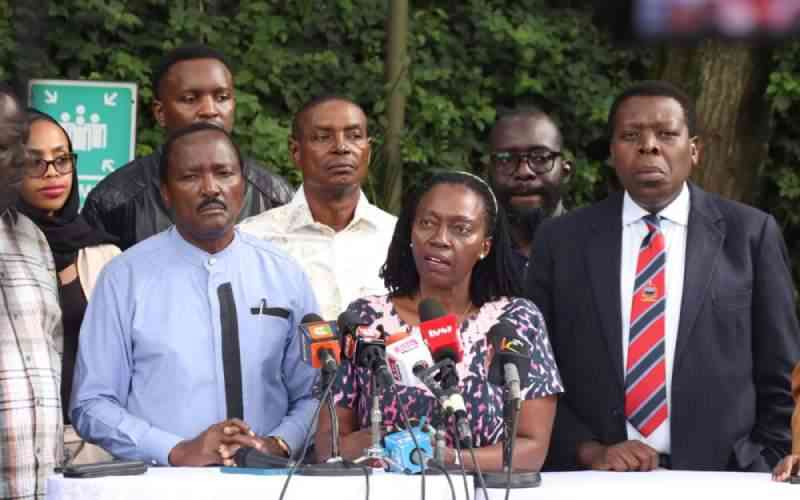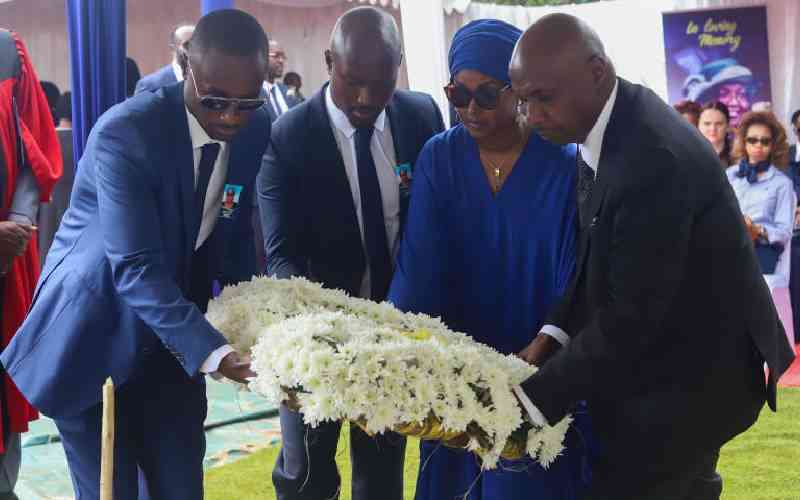NAIROBI, KENYA: Two charred bodies pulled from Kenya's Westgate shopping centre on Thursday are "highly likely" to be two of the attackers, an MP has told the BBC.
Ndung'u Gethenji, chairman of the committee investigating the attack, said AK47 rifles used by the militants were found next to the bodies.
The authorities will now conduct forensic tests on the bodies.
At least 67 people died when suspected al-Shabab militants stormed the Nairobi shopping centre on 21 September.
The attack sparked a four-day siege in which large parts of the shopping centre were destroyed.
The Kenyan authorities have released the names, or nicknames, of four suspects in the attack, but have given few other details.
The Kenya Red Cross lists 23 people as still missing.
Mr Gethenji said the bodies recovered on Thursday were likely to be militants because the army does not use AK47s.
He said another body recovered from the rubble was likely to be a soldier.
It is still not clear whether some of the attackers might have escaped, or even how many attackers there were.
Officials initially said 10 to 15 gunmen were involved, but CCTV footage appears to show only four militants.
Norwegian connection
The BBC's Newsnight programme has revealed that one of the suspected attackers is a 23-year-old Somalia-born Norwegian national, Hassan Abdi Dhuhulow.
His family fled to Norway in the 1990s, but he returned to Somalia in 2009 and allegedly joined the Somali militant group.
Sources in al-Shabab have told the BBC Somali Service that Dhuhulow attended a training camp in El Bur in central Somalia, one of the militants' main bases.
Stay informed. Subscribe to our newsletter
The sources said Dhuhulow took part in many al-Shabab operations in Mogadishu and Kismayo and was well-known in jihadist circles.
Journalist Zubayr Roble in Oslo told the BBC that Dhuhulow frequented the Towfiq Mosque in the Norwegian capital.
Mr Roble said Somalis at the mosque for Friday prayers were in shock about the revelations and anxious over the possible implications the case could have for the Somali community in Norway.
Martin Bernsen, an officer in Norway's Security Service, told the BBC's World At One programme that Norwegian authorities had opened an investigation into the involvement of a Norwegian citizen in the attack "about one week ago".
"We are trying to find out his role and what his connections are. We don't know if he alive or if he is dead."
When asked if the authorities had previously been aware of any previous similar activity among Somalis in Norway, Mr Bernsen said; "It's not the Somalis we're worried about, it's the criminal element.
"We are aware that there are some activities. We have challenges in Norway regarding both al-Shabab and al-Qaeda. Al-Shabab was first known in Norway in 2007 when we investigated money transfer to al-Shabab".
Mr Bernsen said Norwegian authorities were also concerned about people travelling to "conflict areas", including Syria and Somalia, particularly in the past year.
Uganda alert
The BBC's Will Ross in Nairobi says Kenyans still feel there are a lot of unanswered questions, and will be shocked if it turns out that just four gunmen caused such havoc.
The Somali militant group al-Shabab said its members staged the attack in response to Kenya's army carrying out operations on Somali territory.
There are about 4,000 Kenyan troops in the south of Somalia, where they have been fighting the militants since 2011.
Uganda also has troops in Somalia, and the authorities have issued an alert and stepped up security after the US embassy warned of reports of a possible "Westgate-style attack" in Kampala.
The Ugandan police said in a tweet: "Stay alert and watch each other's steps and activities, as we are still threatened by terror."
Al-Shabab has carried out attacks in Kampala before, most notoriously a double suicide-attack that killed more than 70 people in 2010.
Meanwhile, several British Muslims have been put under police protection because of a "credible threat" against them.
Al-Shabab militants apparently singled out Mohammed Ansar and other Muslim commentators in a video that condemned those who spoke out against extremism.
The Islamist group, which is believed to have between 7,000 and 9,000 fighters, controls large parts of Somalia.
Al-Shabab is fighting to create an Islamic state in Somalia and is banned as a terrorist group by both the US and the UK.
-BBC
 The Standard Group Plc is a
multi-media organization with investments in media platforms spanning newspaper
print operations, television, radio broadcasting, digital and online services. The
Standard Group is recognized as a leading multi-media house in Kenya with a key
influence in matters of national and international interest.
The Standard Group Plc is a
multi-media organization with investments in media platforms spanning newspaper
print operations, television, radio broadcasting, digital and online services. The
Standard Group is recognized as a leading multi-media house in Kenya with a key
influence in matters of national and international interest.
 The Standard Group Plc is a
multi-media organization with investments in media platforms spanning newspaper
print operations, television, radio broadcasting, digital and online services. The
Standard Group is recognized as a leading multi-media house in Kenya with a key
influence in matters of national and international interest.
The Standard Group Plc is a
multi-media organization with investments in media platforms spanning newspaper
print operations, television, radio broadcasting, digital and online services. The
Standard Group is recognized as a leading multi-media house in Kenya with a key
influence in matters of national and international interest.






